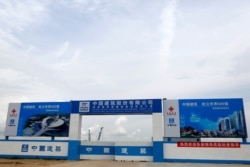The Chinese Embassy in Phnom Penh said Beijing was neither creating a debt trap for Cambodia nor seeking a military presence in the country, in its response to a recent media article.
The embassy issued a statement, released Sunday on Facebook, refuting opinions expressed in a piece aired on U.S. broadcaster Radio Free Asia’s Khmer Service on April 8 claiming “China’s credit activities are entrapping Cambodia into colonization.”
The embassy said accusations that China was intentionally attempting to saddle Cambodia with high levels of debt where it would then be beholden to the Asian superpower were “pure slander.”
“Most of all, China has always been respecting Cambodia’s decision on how to use the loans, and never used the debts to pressure Cambodia in any way,” the statement reads.
The U.S. and some observers have expressed skepticism about Cambodia’s growing relations with China, including fast-growing economic ties and the possibility that the Southeast Asian nation would allow a Chinese military presence at a Preah Sihanouk navy facility – a claim vociferously denied by Cambodia.
The embassy said speculation around China having access to the Ream Naval Base was “nothing more than gauging a gentleman’s kindness with one’s own mean measure.”
Cambodia’s foreign debt stood at $8.8 billion by the end of 2020 with China accounting for $3.9 billion, or 44 percent, of that debt, according to Cambodia’s Finance Ministry.
China is Cambodia’s largest source of infrastructure investment and has become the country’s chief patron on the economic and political front.
More than $3 billion in concessional loans have been provided by China for the construction of around 3,000 kilometers of roads and eight bridges in Cambodia, according to comments from Cambodian Transportation Minister Sun Chanthol in December.
Sophal Ear, an associate professor at the U.S.-based Occidental College, said the statement revealed that China was apprehensive about their investments in Cambodia being characterized as a debt trap.
He said it was apparent that Cambodia was getting increasingly reliant on China’s economic largesse.
“The African proverb applies: when a man walks with his hand in another man's pocket, he must walk where the other man walks,” he said in an email.
Global discussions about countries facing potential debt traps with China have intensified following Chinese President Xi Jinping’s signature Belt and Road Initiative, which has invested billions of dollars in ambitious infrastructure projects across the world.
Analysts usually point to two examples of this debt trap: China’s takeover of Hambantota port in Sri Lanka and the state-run Electricite du Laos in neighboring Laos.
In December 2017, Sri Lanka handed over its commercial port of Hambantota to a Chinese state firm on a 99-year concession deal after struggling to repay its debts to the state-owned enterprise.
Laos, facing a pandemic-triggered economic crisis and credit default in 2020, gave up a majority share of its state-run energy firm, Electricite du Laos, to China’s state-owned China Southern Power Grid.
The landlocked country, whose credit score was downgraded by Fitch Ratings in September 2020, had $12.6 billion in foreign debt, of which China held $5.9 billion, according to Nikkei Asia Review’s January publication.
Em Sovannara, a political commentator, said Cambodia was in a firmer economic position in recent years, with increases in revenue collections, that would help it to negotiate better terms and competitive debt packages with development partners and other countries, including China.
“But in case Cambodia fails to make a repayment, it could end up like Laos and Sri Lanka,” Em Sovannara said.
He said China should improve the quality and transparency of its assistance to Cambodia because the Cambodian people had limited trust in China’s “top-down and benefitting officials over people” approach.





